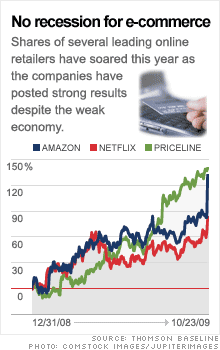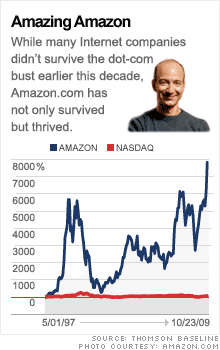Internet bubble 2.0? Not so fast
Amazon and Netflix just hit all-time highs while other dot-coms surge, too. Unlike 10 years ago, online retail leaders are profitable and most don't look overvalued.



NEW YORK (CNNMoney.com) -- It's beginning to look a lot like Christmas in October for online retailing stocks. Christmas 1999, that is.
Shares of Amazon.com (AMZN, Fortune 500) hit an all-time high Friday. Ditto for the stock of DVD rental service Netflix (NFLX). Online jewelry retailer Blue Nile (NILE) has recently given shareholders some bling to flash around: The stock's up 165% this year.
And Priceline.com (PCLN) is making celebrity spokesman William Shatner proud. Shares of Priceline, which fell as low as a split-adjusted $6 a share in the wake of the dot-com bust earlier this decade, have surged 140% this year and are now trading at almost $180 -- their highest level since the summer of 2000.
What in the name of Henry Blodget is going on here?
The recent gains in e-commerce stocks shouldn't be that big of a surprise. Online retailing stocks have always tended to take off in September and October in anticipation of strong sales during the holidays.
It seems that with each passing year, more and more consumers are foregoing the frenzy that is Black Friday -- and as harried, last-minute trips to the malls in December -- in favor of buying gifts online from the comfort of their own home -- or cubicle.
And it looks like this year may be no exception. Recession be damned!Amazon, for example, issued upbeat guidance for the fourth quarter on Thursday. That news, combined with third-quarter sales and profits that far exceeded analysts' forecasts, helped boost the stock Friday.
Netflix, which doesn't benefit as much from holiday gift giving as some other online retailers, also posted blockbuster results (unlike its main competitor Blockbuster) for the third quarter and predicted healthy profits for the fourth quarter.
"The Internet sector in general has had a bounce back this year in both stock performance and their financials. The companies were more resilient during the downturn and are now having an acceleration in their growth levels thanks to more evidence of an economic recovery," said Frederick Moran, an analyst with The Benchmark Co.
What's more, online commerce companies still only control a small percentage of the overall retail market. According to figures from the Census Bureau, e-commerce sales totaled $32.4 billion in the second quarter, just 3.6% of the $906 billion in total retail sales.
Morris Mark, president of Mark Asset Management, a New York-based hedge fund that owns Amazon, said this means that the company still has ample room to grow.
"Over time, e-commerce is going to grab an increasing share of the overall retail dollar. It could go as high as 10% to 12% over the next four to five years. That's a powerful trend," he said.
Still, Internet stocks have enjoyed an amazing run. So it's fair to ask if this resurgence is the beginning of a new dot-com bubble. The answer is "not yet." But investors need to be cautious.
On the one hand, there is a significant difference between how Internet stocks were behaving in 1999 and how they are acting in 2009. Ten years ago, most of the online commerce companies had yet to make a profit.
The stocks were inflated on hope and hype. Many were wasting the proceeds from their hot IPOs on expensive advertising campaigns. And it was still not certain which companies would emerge as long-term winners and which would go out of business.
Remember eToys, Buy.com and Webvan? And who could forget Pets.com and its ubiquitous sock puppet? In case you did, he (it?) has avoided the bread line by shilling for BarNone, a subprime auto lending company. Oy.
Flash forward ten years and there are only a few companies that are still public, such as Amazon, Priceline and eBay (EBAY, Fortune 500).
Making money in online retail is no longer a pipe dream. So if you want to be cynical about how well dot-com stocks are doing, don't argue that these companies don't have a viable business model.
"A decade ago, there were literally hundreds and hundreds of Internet companies losing money. Then there was a transition point where people started to want a path to profitability," said Scott Kessler, head of technology sector equity research at Standard & Poor's. "But over the past couple of years there has been even more scrutiny. These companies need to be big and profitable."
You can, however, scoff at how insanely valued some of these Internet stocks are these days. Amazon, for example, is trading at 49 times 2010 earnings estimates. That seems more than a little rich even though analysts expect profits to increase by a healthy 33% next year.
And Blue Nile is trading at the Hope Diamond-like valuation of 66 times next year's profit forecasts. That's more than twice the company's expected earnings growth rate of 26% for 2010.
Moran said Amazon still may be worth this lofty valuation since the company has been smashing Wall Street's estimates. Analysts had predicted that Amazon would earn $2.17 a share in 2010 before the company reported its latest results last Thursday. Now, analysts are forecasting a profit of $2.43 a share.
Still, Moran conceded that Amazon's valuation may be a bit high for more conservative investors. Fortunately though, some of the smaller online retailing companies aren't at such frothy levels.
Priceline trades at about 20 times 2010 profit forecasts while Netflix sports a P/E of about 25 based on next year's earnings projections. That is a lot more reasonable considering that both companies are expected to report earnings growth of nearly 20% next year.
Plus, neither trades at as big of a premium to the overall market. The S&P 500 is trading at around 15 times earnings estimates for next year.
The fact that many Internet companies have weathered what people keep referring to as the worst economic downturn since the Great Depression is yet another reason to potentially buy them. Investors may not yet realize how much more profitable they could be if the economic recovery is for real.
"These companies have not been in the eye of the storm the way that banks, auto companies and homebuilders were. A majority of companies in the Internet sector kept their heads down, did what they do best and are still reasonably valued or undervalued," he said.
But like in any sector, investors need to realize that there will be winners and losers. Amazon.com is at its highest level ever, but eBay is still trading about 60% below its peak price. And in the world of online search, it's no secret that Google (GOOG, Fortune 500) continues to eat Yahoo's (YHOO, Fortune 500) lunch.
And that's another big (and healthy) difference between how Internet stocks are doing in 2009 as compared to 1999. Ten years ago, all you needed was an "e-" at the beginning of your corporate name or ".com" at the end in order to do well on Wall Street.
Nowadays, investors are far more discerning.
Talkback: Do you think any Internet stocks are worth buying now? If so, which ones? Or is this a repeat of the dot-com bubble of the late 1990s? Share your comments below. ![]()

